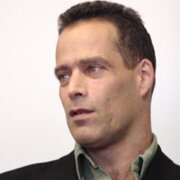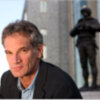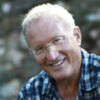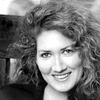Sebastian Junger
Author of The Perfect Storm: A True Story of Men against the Sea
About the Author
Sebastian Junger was born in 1962 in Belmont, Massachusetts. He received his BA degree from Wesleyan University in Cultural Anthropology in 1984. He is a freelance journalist who writes for numerous magazines, including Outside, American Heritage, Men's Journal, and the New York Times Magazine. As show more an underemployed journalist who assigned himself stories and worked as a stringer for the Associated Press in Bosnia, Junger was fascinated by the dangers that people face regularly while doing ordinary jobs. Junger was working as a climber for a tree removal service when the storm occurred that provided the inspiration for his first book. The Perfect Storm (1997) is a carefully researched account of the wreck of the swordfishing boat Andrea Gail, The wreck took place during what one meteorologist called a "perfect storm"--a storm with the worst possible conditions. In order to relate the story of a disaster that left no survivors and had no eyewitnesses, Junger used a combination of sound research, technical detail, and personal insight to reconstruct the final hours. After the publication of this book he was nicknamed the new Hemingway. In 2000, this book was made into a film starring George Clooney and Mark Wahlberg. He wrote several books such as War which is about his time spent with a U.S. Army platoon in Afghanistan. At the Sundance Film Festival in 2010 his documentary Restrepo won Grand Jury Prize for a domestic documentary. Junger's book, Tribe, made the New York Times Bestseller list in 2016. (Bowker Author Biography) show less
Image credit: Photographed at BookPeople in Austin, Texas by Frank R. Arnold
Works by Sebastian Junger
In My Time of Dying: How I Came Face to Face with the Idea of an Afterlife (2024) 151 copies, 5 reviews
WAR by Sebastian Junger 1 copy
Sea Stories Collection: "In the Heart of the Sea", "The Perfect Storm", "Ship of Gold in the Deep Blue Sea" (2001) — Contributor — 1 copy
War 1 copy
Associated Works
The Book That Changed My Life: 71 Remarkable Writers Celebrate the Books That Matter Most to Them (2006) — Contributor — 397 copies, 18 reviews
Why We Write: 20 Acclaimed Authors on How and Why They Do What They Do (2013) — Contributor — 183 copies, 10 reviews
Fire Fighters: Stories of Survival from the Front Lines of Firefighting (2002) — Contributor — 14 copies
Tagged
Common Knowledge
- Canonical name
- Junger, Sebastian
- Birthdate
- 1962-01-17
- Gender
- male
- Nationality
- USA
- Birthplace
- Belmont, Massachusetts, USA
- Places of residence
- Belmont, Massachusetts, USA
- Education
- Wesleyan University (BA | Cultural Anthropology)
- Occupations
- journalist
author - Relationships
- Deghati, Reza (colleague)
- Organizations
- Vanity Fair
- Awards and honors
- National Magazine Award
SAIS Novartis Prize for journalism - Short biography
- Sebastian Junger is a freelance journalist and award-winning author with expertise in covering dangerous work around the globe. He has reported from such places as Liberia, Sierra Leone, Kosovo, Kashmir, Cyprus, the American West and, most recently, Afghanistan.
Members
Reviews
Lists
Awards
You May Also Like
Associated Authors
Statistics
- Works
- 18
- Also by
- 14
- Members
- 12,171
- Popularity
- #1,927
- Rating
- 3.9
- Reviews
- 278
- ISBNs
- 217
- Languages
- 15
- Favorited
- 10






































From there he goes on to examine the literature on near death experiences and peoples sense of other worldliness and comes to the conclusion that there is an afterlife. He examines the rationality of that conclusion by using his father’s highly developed rationality as a foil. He knows there is an afterlife as a leap of faith recognizing that proof is not possible.
His thoughts and the evaluation of his experience are very thought provoking. His examination of quantum physics emphasizes both that he can’t prove an afterlife in the Euclidean sense of proof and also that he has complete faith in the truth of the hypotheses.
His exploration of quantum mechanics and insights into the complexity of the question: what is consciousness are very thought provoking.
He is not telling the reader what to believe just explaining that for him there is no doubt.… (more)